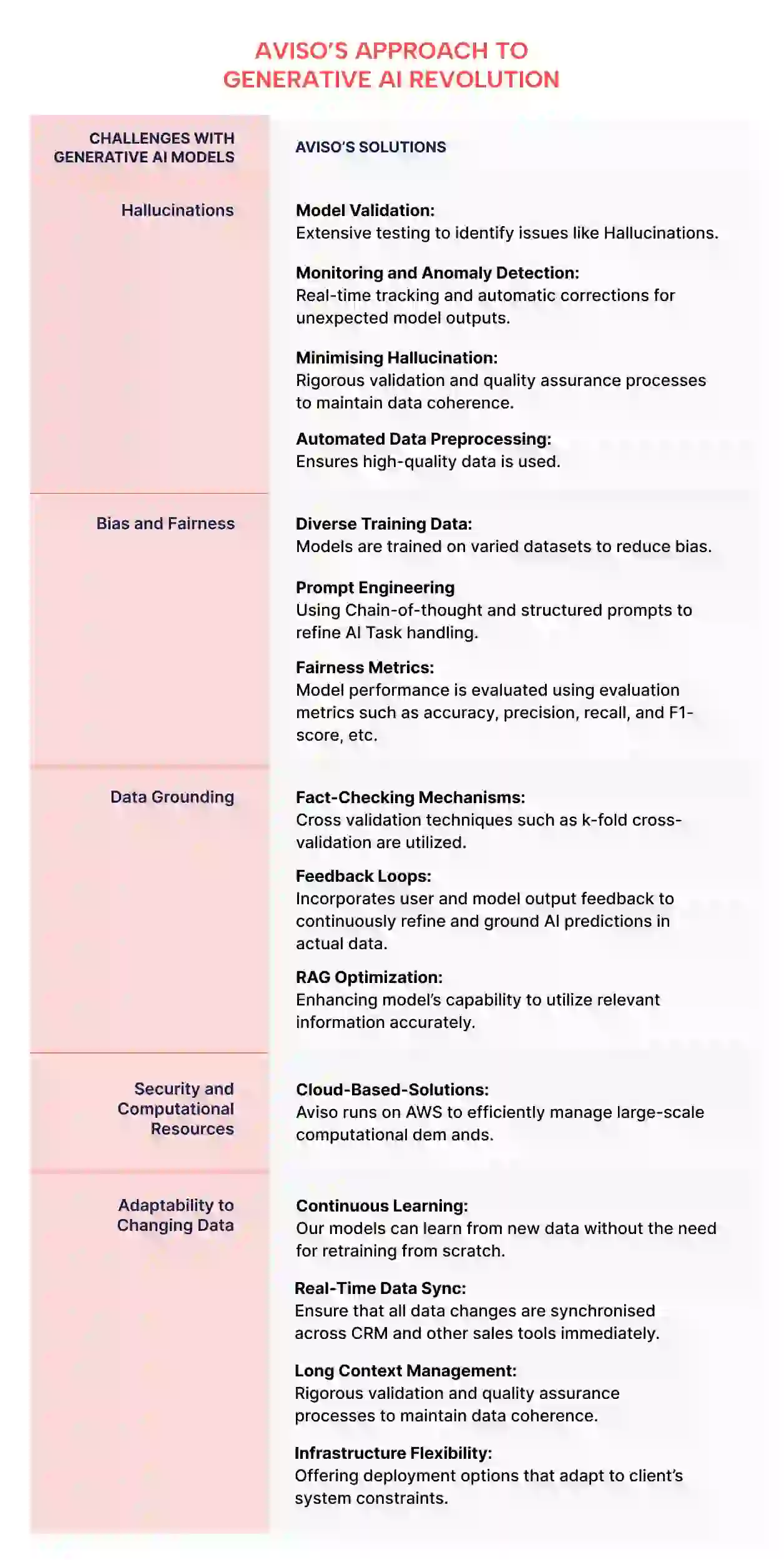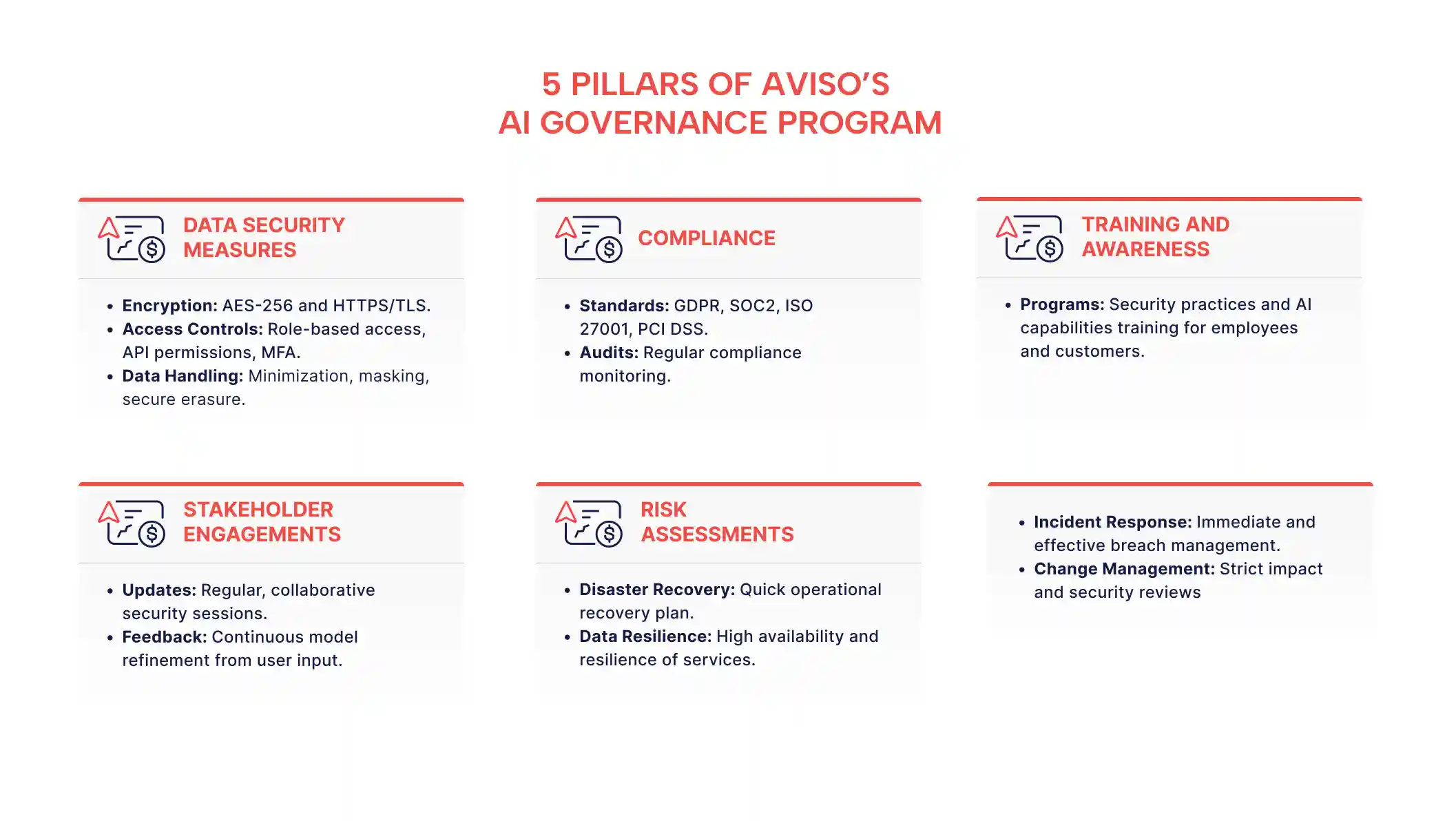Building Trust in the GenAI Era: Aviso's Framework for Advanced Data Security and Governance
Nov 21, 2024
Generative AI, or GenAI, is transforming industries globally, offering a spectrum of innovative solutions. GenAI's ability to craft new content from existing data, coupled with its simple natural language interface, has made tools like ChatGPT, Gemini, and others indispensable for organizations striving for efficiency. Yet, with the rise of GenAI, there has been a parallel increase in data privacy and security concerns that cannot be ignored.
AI adoption is soaring, with nearly 70% of companies in a recent S&P Global report indicating they have launched AI initiatives. While AI promises to transform business operations, it also introduces new security risks and exposes companies to potential threats. Recent findings from S&P Global and Forrester confirm that data security remains the primary obstacle for organizations deploying generative AI. The growing use of AI has led to an increase in data stored across various cloud platforms, escalating the security and privacy risks associated with diverse and widespread cloud architectures.
Moreover, with McKinsey forecasting that GenAI could add up to $4.4 trillion to global corporate profits annually, it's imperative that companies not only leverage this potent tool but also implement robust frameworks to guard against the risks of data breaches and misuse.
Challenges with Generative AI Models in Business Environments
Generative AI models are transforming business operations with their ability to create new content and insights from existing datasets. However, their deployment is not without challenges. Understanding these challenges is crucial for organizations to mitigate risks and harness the full potential of generative AI technologies.
Hallucination in AI Outputs: Generative AI models, particularly those used in natural language processing or data synthesis, may sometimes "hallucinate" or generate false or misleading information. This issue is especially critical in environments where precision is essential, such as sales forecasting or customer relationship management.
Bias and Fairness: AI models can inadvertently perpetuate or even amplify existing biases present in the training data. Bias in AI models can lead to skewed outcomes, affecting everything from customer interactions to sales strategies. It’s important to use diversified datasets for training and to continuously monitor outcomes for unintended biases.
Data Grounding: Generative AI models often struggle with grounding their outputs in factual accuracy. They may generate plausible-sounding content that, upon closer examination, lacks substantiation.
Scalability and Computational Resources: Implementing generative AI solutions often requires substantial computational resources, which can be a hurdle for some organizations. The cost of data storage, processing power, and energy consumption can be substantial.
Adaptability to Changing Data: Generative AI models need continuous updates to stay relevant as market dynamics change. AI models can become outdated as the data landscape evolves, making it crucial for systems to adapt to new information continually.
How Aviso Harnesses Gen AI for Optimized Performance
At Aviso, we recognize the unique challenges posed by the AI era, especially with the advent of generative AI models, which can sometimes experience issues like data hallucination and grounding errors. To effectively address these challenges and optimize the performance of our AI models, we have implemented robust measures, such as:
Automated Data Preprocessing and Real-Time Data Synchronization: Aviso automates data cleaning, normalization, and feature engineering through our MLOps framework, ensuring high-quality data for training. Our integration with CRM systems features real-time data streaming, enhancing accuracy and security.
Model Choice and Customization: We assess various model variants and choose the right one for each client’s needs, whether for text completion, NLP tasks, or conversational interactions. Our platform leverages closed-source models for insights from public data sources like earnings calls and SEC filings, while open-source models are fine-tuned to generate insights from customer data, ensuring data privacy.
Model Training and Validation: The AI models are trained on diverse datasets (CRM, emails, Calendar) to overcome bias and are subjected to extensive validation processes to identify any potential issues, including hallucinations. These models are tested across various scenarios to ensure they perform reliably and accurately.
Monitoring and Anomaly Detection: Aviso employs monitoring systems that track the performance of AI models in real time. Anomaly detection mechanisms are in place to quickly identify and address any unexpected model outputs, including hallucinations. Additionally, automated AI guardrails check both input and output data for compliance with security standards, ensuring that our AI models operate within established boundaries and do not produce or accept harmful data.
Enhanced Security and Compliance: By hosting open-source models on internal servers and enabling deployments within the secure confines of a company's infrastructure, we ensure data remains protected, upholding the highest standards of data security and privacy.
Platform-Agnostic Integration and Flexible Deployment: Aviso's GenAI architecture is platform-agnostic, facilitating the integration of the latest AI model breakthroughs into existing workflows. This flexibility allows us to meet diverse infrastructure needs, whether they rely on CPUs or require advanced GPU resources.
Optimizing RAG Performance: To maximize the effectiveness of RAG models, Aviso has developed advanced optimization strategies. These include efficient retrieval mechanisms and context augmentation, which enhance the model's ability to access and utilize relevant information quickly and accurately.
Mastering Advanced Techniques: Aviso’s AI frameworks are uniquely designed to manage long-context scenarios, which is essential for maintaining high performance during complex interactions. Additionally, we have mastered the art of prompt engineering, utilizing advanced techniques such as Chain-of-Thought and structured prompt components.
Performance Monitoring and Tuning: To assess model performance and generalization ability, cross-validation techniques such as k-fold cross-validation are utilized, ensuring that the model's performance is robust across different subsets of the data. Models are trained using the prepared data, and their performance is evaluated using appropriate evaluation metrics such as accuracy, precision, recall, F1-score, etc.

Know more about Aviso’s approach to the Generative AI revolution.
Strategic Safeguards: The Pillars of Aviso's AI Governance Framework
Building on our commitment to overcoming AI biases and accuracy issues, it is equally crucial to ensure the governance of AI operations. Effective AI governance not only supports operational integrity but also secures the data ecosystem, creating a trustworthy foundation for all AI-driven activities.
We have several measures in place to ensure the privacy and security of the data processed by our AI models.
Aviso's AI governance is structured around five key pillars, each designed to uphold the highest standards of data security, integrity, and compliance.
1. Data Security Measures
Data Encryption: We employ state-of-the-art encryption techniques, such as AES-256, to protect your data both at rest and in transit. Our use of HTTPS/TLS protocols ensures that data remains secure even over public networks.
Advanced Access Controls: Access to data within Aviso is stringently controlled through role-based access and API permissions, ensuring only necessary personnel can interact with sensitive information. We reinforce this with multi-factor authentication (MFA) to further reduce the risk of unauthorized access.
Data Minimization and Masking: By collecting only the necessary data for our operations and employing data masking, we minimize the risks associated with data handling and ensure compliance with privacy standards. Our erasure protocols are designed to overwrite data securely, making it irretrievable once deleted.
2. Compliance with Relevant Regulations and Standards
Trust and Compliance at the Core: Aviso adheres to GDPR, SOC2, and other compliance standards like ISO 27001 and PCI DSS. Our operations on AWS benefit from these top-tier security protocols, ensuring we meet global standards.
Compliance Monitoring: Regular audits, both internal and external, verify our adherence to these rigorous standards, ensuring continuous compliance and improvement.
3. Training and Awareness Programs
Awareness and Training: Recognizing that human error can lead to security vulnerabilities, we invest heavily in training our employees and customers on the latest security practices and AI capabilities. This not only enhances their ability to use AI effectively but also safeguards against potential security risks.
4. Stakeholder Engagements
Engagement in Security Practices: We maintain high stakeholder engagement through regular updates and collaborative sessions to align on security practices and governance policies, ensuring cohesive and informed approaches across the board.
Feedback Mechanisms: These are vital for iterating and improving AI systems. Feedback from users and real-time performance data is continually analyzed to refine our models.
5. Risk Assessments
Disaster Recovery: Aviso’s infrastructure is designed to withstand disruptions, with an auditor-approved disaster recovery plan that ensures a rapid return to normal operations, typically within 24 hours, minimizing data loss.
Data Resilience: We maintain high availability and resilience of our services to prevent data loss and ensure continuous operation, which is crucial for business continuity.
Incident Response: Our incident response strategy includes immediate actions, thorough investigation, and long-term mitigation measures to handle potential security breaches effectively.
Change Management: Aviso enforces rigorous change management controls, including impact assessments, security reviews, and privacy evaluations. This ensures that all changes meet our high standards for security and compliance.

Looking Ahead: The Roadmap for Responsible AI Innovation
As we venture deeper into the AI era, the importance of robust data governance and security cannot be overstated. AI offers incredible potential benefits, from boosting productivity to driving innovation. However, it also introduces new challenges surrounding data protection and cybersecurity that organizations must face head-on.
For businesses, transitioning to an AI-first model demands a proactive approach to safeguarding sensitive information. This means not only implementing strong security measures but also ensuring clear policies and procedures around data access and management.
Ultimately, the key to thriving in the AI era lies in balancing the adoption of advanced technology with a firm commitment to data governance and security. By staying informed and vigilant, organizations can navigate this dynamic landscape securely and confidently.
Ready to strengthen your AI journey with trusted data governance? Partner with Aviso for secure, intelligent solutions that empower your growth.







